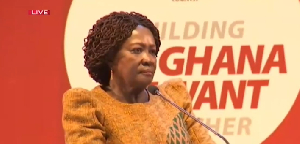Business News of Monday, 4 February 2013
Source: B&FT
GroFin commits more funds to SMEs
The Chief Executive Officer of GroFin Africa, Guido Boysen, has advised businesses and entrepreneurs to wean themselves off the banks and consider alternative ways of financing, as the company has pledged to commit more funds to the growth of SMEs in the country.
Mr. Boysen, who is on a working visit to the country, told the B&FT during an interview in Accra that there are a number of existing specialised institutions and private equity funds in the country, with tailored business finance and experienced business support to grow the businesses of entrepreneurs.
“The first point of call for a lot of businesses and entrepreneurs is the bank. So a lot of entrepreneurs do not consider alternative ways of financing their business -- like specialised investment and finance companies such as Grofin and other private equity funds.
“So there is need to educate the market and entrepreneurs on the many ways to finance their businesses other than the banks, family and friends,” he said.
Established in 2004, GroFin has approximately US$320million in funds under management and is able to leverage significant expertise and experience from its operations in nine countries -- including Ghana, Kenya, Mauritius, Nigeria, Oman, Rwanda, South Africa, Tanzania and Uganda.
Mr. Boysen said the Ghana country office, which began operations in 2010, has so far assisted about 36 companies with more than GH¢25million in funding to help them grow.
According to managers of Grofin, the figure is expected to reach about GH¢30million by the end of April this year, when nine additional firms get financial support from the company in response to demands for the firm’s support.
“Our experience here in Ghana has been good. Our office here always exceeds its investment target. It is an opportunity for us to be here because Ghana has an environment that makes it easier to do business.
“This year, we hope to invest about GH¢10million in SMEs across the country. By next year we want clients who have benefitted from our expertise to hit 60,” added Mr. Samuel Sedegah, General Manager for GroFin Ghana.
GroFin supports locally-owned companies requiring funding of between US$50,000 to US$1.5 million to facilitate their growth. Funding is matched to a business’s needs to ensure the most appropriate lending structure and this is coupled with business support that begins at application stage and continues for the duration of the loan.
According to Samuel Sedegah, General Manager for GroFin Ghana, the company currently charges very competitive interest rates on loans with term of up to seven years.
He explained that “every GroFin client receives business development assistance to ensure a viable business plan is in hand before the disbursement of any finance. This is followed by further business development after the flow of finance to drive business profitability and growth.
Sedegah continued: “What we offer is not free money. The term of our loans is based on what we think the business needs based on our conversations with the entrepreneur and analysis of their business plan. For us we firstly look at whether the business is viable and managed and owned by committed entrepreneurs or business people that are local and involved directly in the business themselves.
We then look at what collateral the entrepreneur is able to offer and this impacts the pricing of the loan as opposed to whether we will necessarily make funding available. This is an important difference in our approach as opposed to other lenders.”
He further explained: “The kind of businesses that we usually deal with are the ones that have less than 150 employees, gross assets of less than US$15 million and / or turnover of less than US$20 million per annum. This is just a guideline of the kind of businesses that we deal with. Obviously some are much smaller than that and some grow to be larger while they are with us.
About 25 per cent of our portfolio are start-ups. We cannot operate in the SME sector and say we are not going to support start-ups.”
The company’s decision to bring a holistic offering of support to SMEs in the country comes at a time that the Ghanaian economy is estimated to record one of the highest growth figures in the world fuelled by a growing SME sector and the oil find.
Entertainment









